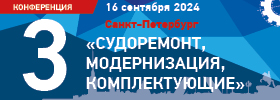Sergei Baryshnikov: “Operational training should be performed by dedicated educational institutions”
The merger of Moscow State Academy of Water Transport (MSAWT) into Admiral Makarov State University of Maritime and Inland Shipping, the largest educational institution in Russia’s water transport sector, is nearing completion. The University Rector Sergei Baryshnikov tells IAA PortNews about the process.
- Mr Baryshnikov, when will the merger of Moscow State Academy of Water Transport (MSAWT) into Admiral Makarov State University of Maritime and Inland Shipping be completed?
- The merger of MSAWT into our university is nearing completion. The document has been signed and by the next educational year MSAWT will become Moscow Academy of Water Transport, a branch of Makarov University. The historical name of Moscow institution will be preserved.
The process is in full swing. I would like to emphasize that MSAWT management is well prepared for the procedure. Of course, we need a deep insight into the situation to proceed.
Among the challenges I would only mention weak relations of MSAWT with its branches, but it’s fixable. There will be three branches left: in Rybinsk, Ufa and Veliky Ustyug. The branch in Rostov-on-Don is being reorganized to merge with Novorossiysk Maritime State Academy named after Admiral Ushakov .
Optimization of all branches’ operation will be possible in the framework of Makarov University. For example, a practice ground in Veliky Ustyug is close to our Kotlas branch. We will look into collaboration of the two grounds for networking in the field of education and practical training.
- How many students are there in Makarov University including MSAWT?
- We number about 13,000 students today with budget funded places making some 65%. Besides, about 20,000 persons are trained every year under continuing professional education programmes. The personnel involved in the education process exceeds 2,000 including about 1,200 teachers.
Admiral Makarov University now consists of four institutes: Marine Academy integrating all operational professions and the Arctic faculty; Water Transportation Institute integrating port workers, hydraulic engineers, IT and part of managers; Institute of International Transport Management integrating lawyers, managers and logistics specialist; Institute of Additional Professional Education offering professional development and conversion programmes.
We try not to increase the number of institutes, so MSAWT will be not a separate institute but a branch.
Admiral Makarov University has the largest network of branches in the field so we are looking into establishing an additional position of Branches Prorector.
- Makarov University is the only higher education institution in the country to train specialists for nuclear-powered civil ships. How is this activity developing?
- We have a good news. FSUE Atomflot has recently made a decision to seek closer cooperation with Makarov University in training personnel for nuclear-powered icebreakers as an alternative to establish their own simulation center.
We are ready to start this sort of training right now. We have both personnel and facilities. For decades we have been training ship engineers to work with nuclear power plants. We have equipment to simulate any emergency situation.
I think we will soon sign a framework agreement with Atomflot to train students for operation on board vessels with nuclear power plants (including arranging of maritime practice on board nuclear-powered icebreakers) and to offer continuing professional education through online training.
Atomflot is striving a lot to attract personnel to nuclear-powered icebreakers. Increase of wages for graduates coming to the company is under consideration.
- What other shipping companies are interested in Makarov University graduates?
- We have agreements signed with 41 shipping companies of Russia on arrangement of maritime practice for Makarov University students. Among them are Gazpromflot, Rosneft, Sovcomflot, North-Western Shipping Company, Palmali Group.
There is a practice of signing agreements between students and shipping companies starting from the third year of education. Apart from their scholarships students are additionally paid several thousands of roubles per month. With their diplomas received, they are employed by those shipping companies. Excellent marks are not a must. The fleet needs well disciplined B level students rather than students with excellent marks. A-students are usually focused on science. We already have hundreds of such agreements.
- What is your opinion about the idea of establishing a unified transport institution?
- In my personal opinion, it is a good idea. Long time ago it was announced that a unified transport is not to cover operational specializations. It is more about training of specialists for logistics and the sector of multimodal transportation with deeper insight into specific features of different means of transport.
Logistics specialists familiar with specific features of each means of transport will certainly be better prepared as compared with graduates of a specialized educational institution. Such specialists will be in higher demand in the labour market. It remains to be seen but I believe they will.
As for operational training it should be performed by dedicated educational institutions.
Interviewed by Nadezhda Malysheva






